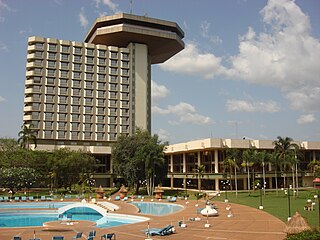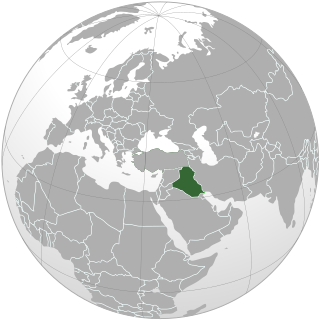
The United Nations Security Council (UNSC) is one of the six principal organs of the United Nations (UN) and is charged with ensuring international peace and security, recommending the admission of new UN members to the General Assembly, and approving any changes to the UN Charter. Its powers as outlined in the United Nations Charter include establishing peacekeeping operations, enacting international sanctions, and authorizing military action. The UNSC is the only UN body with authority to issue resolutions that are binding on member states.

The United Nations General Assembly, UNGA; French: Assemblée générale des Nations unies, AGDNU is one of the six principal organs of the United Nations (UN), serving as its main deliberative, policymaking, and representative organ. Currently in its 79th session, its powers, composition, functions, and procedures are set out in Chapter IV of the United Nations Charter.

The member states of the United Nations comprise 193 sovereign states. The United Nations (UN) is the world's largest intergovernmental organization. All members have equal representation in the UN General Assembly.

A United Nations resolution is a formal text adopted by a United Nations (UN) body. Although any UN body can issue resolutions, in practice most resolutions are issued by the Security Council or the General Assembly, in the form of United Nations Security Council resolutions and United Nations General Assembly resolutions, respectively.

United Nations Security Council resolution 1244, adopted on 10 June 1999, after recalling resolutions 1160 (1998), 1199 (1998), 1203 (1998) and 1239 (1999), authorised an international civil and military presence in the Federal Republic of Yugoslavia and established the United Nations Interim Administration Mission in Kosovo (UNMIK). It followed an agreement by Yugoslav President Slobodan Milošević to terms proposed by President of Finland Martti Ahtisaari and former Prime Minister of Russia Viktor Chernomyrdin on 8 June, involving withdrawal of all Yugoslav state forces from Kosovo.

The African Union-United Nations Hybrid Operation in Darfur was a joint African Union (AU) and United Nations (UN) peacekeeping mission formally approved by United Nations Security Council Resolution 1769 on 31 July 2007, to bring stability to the war-torn Darfur region of Sudan while peace talks on a final settlement continue.

UN Security Council Resolution 1835 was adopted unanimously by United Nations Security Council on 27 September 2008. The resolution was in response to 15 September report of the International Atomic Energy Agency (IAEA) that stated that Iran had not suspended uranium-enrichment-related activities. The resolution reaffirmed four previous Security Council resolutions: 1696 (2006), 1737 (2006), 1747 (2007), and 1803 (2008).

United Nations Security Council Resolution 2029 was unanimously adopted on 21 December 2011, after recalling resolution 2013. The Security Council on this morning extended the terms of office of four judges of the Trial Chamber until 30 June 2012 or sooner if their trials were completed.

United Nations Security Council Resolution 2031 was unanimously adopted on 21 December 2011 after recalling resolution 1913 (2010). The Security Council, concerned over the security vacuum in many parts of the Central African Republic and of reports of continued human rights violations there, extended the mandate of the United Nations Peacebuilding Office in that country (BINUCA) until 31 January 2013.

The United Nations Supervision Mission in Syria (UNSMIS) was a United Nations peacekeeping mission in Syria, set up in 2012 as a result of United Nations Security Council Resolution 2043 in response to the Syrian Civil War. It was commanded by Norwegian Major General Robert Mood until 20 July 2012 followed by Lieutenant General Babacar Gaye from Senegal. Although observers remain in the country, Mood suspended their mission on June 16, 2012, citing "escalating violence". Observers will conduct no further patrols and stay in their current positions until the suspension is lifted. On 20 July 2012, the Security Council extended UNSMIS for a final period of 30 days. According to resolution 2059, the Council would only consider more extensions in the event that the Secretary-General reports and the Security Council confirms the cessation of the use of heavy weapons and a reduction in the level of violence sufficient by all sides to allow UNSMIS to implement its mandate.

United Nations Security Council Resolution 2062 was unanimously adopted on 26 July 2012. It related to the situation in Côte d'Ivoire and extended the mandate of the United Nations Operation in Côte d’Ivoire (UNOCI) until July 2013.

The Republic of Korea and the Democratic People's Republic of Korea were simultaneously admitted to the United Nations (UN) in 1991. On 8 August 1991, the UN Security Council passed Resolution 702, recommending both states to the General Assembly for membership. On 17 September 1991, the General Assembly admitted both countries under Resolution 46/1.

United Nations Security Council Resolution 2110 is a United Nations Security Council resolution adopted unanimously by the United Nations Security Council on 24 July 2013, extending the United Nations Assistance Mission for Iraq until 31 July 2014 as stipulated in several previous resolutions The resolution signaled its intention to review the original mandate, as stipulated in UNSC resolution 2061 within twelve months.
Malaysia became the 82nd member of the United Nations on 17 September 1957. Malaysia has held a rotational non-permanent seat on the United Nations Security Council for four terms, and has participated in over 30 United Nations peacekeeping missions through its MALBATT contingent since October 1960.

United Nations Security Council Resolution 2166, concerning the shootdown of Malaysia Airlines Flight 17, was sponsored by Australia and adopted unanimously on 21 July 2014. The resolution expressed support for the "efforts to establish a full, thorough and independent international investigation into the incident in accordance with international civil aviation guidelines" and called on all United Nations member states "to provide any requested assistance to civil and criminal investigations".

The United Nations Security Council established the Peacekeeping Force for Mali effective 1 July, unanimously adopting resolution 2100 (2013) with the aim to support the political transition process and help stabilize Mali.

Adopted unanimously on June 24th, 2013, the United Nations Security Council Resolution 2106 (S/RES/2016) centers around the protection of women from sexual violence, especially in armed conflict or post-conflict areas. The resolution highlights the need for countries to both:
United Nations Security Council resolution 2122 was adopted in 2013.

United Nations Security Council Resolution 2623 called for the eleventh emergency special session of the United Nations General Assembly on the subject of the 2022 Russian invasion of Ukraine. Albania and the United States introduced the resolution before the United Nations Security Council, which adopted it on 27 February 2022. Russia voted against while China, India and the United Arab Emirates abstained. As this was a procedural resolution, no permanent member could exercise their veto power.















